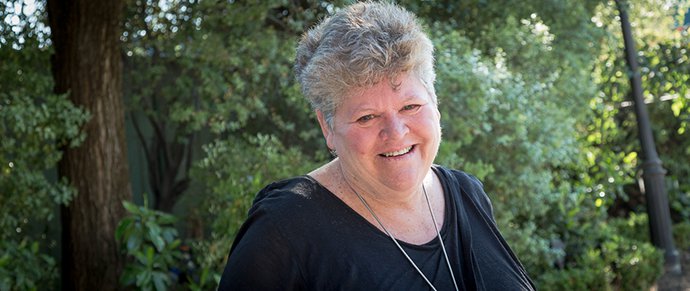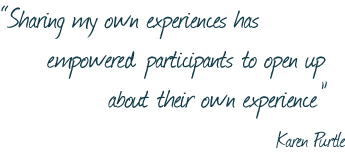Karen Purtle – Peer Support Worker

The role of the peer support worker is becoming increasingly popular in the mental health care sector. Harry Easton speaks to Karen Purtle, who is using her past experiences to empower mental health consumers today.
Travelling into the unknown can be a daunting task. Not knowing where a journey will take us is part of life, but it never hurts having a voice of guidance along the way. Having family and friends to support us is important, as is having someone who has been down the path before. This is why the benefits of having a peer support worker alongside you are second to none.
Karen Purtle is a peer support worker based in Albury. She believes her role is one that doesn’t just benefit the patients and consumers.
“Peer support workers enhance the delivery of the service. They are not only a resource for participants. This worker is a resource for the other staff members in the team. They are available to consult around their lived experience.”
For Karen, her experiences as someone living with bipolar have shaped her life dramatically. She has lived with bipolar for over 40 years and says the lack of knowledge around mental illnesses when she first had a “breakdown” as an 18 year old made life extremely difficult.
 “For many years I was undiagnosed and I was going through episodes of mood swings and periods of being really unwell and not coping. I would become well but then I would have another episode. It wasn’t until 2001 when I had a major panic episode in Melbourne that I was diagnosed with bipolar and all of a sudden it made sense. I was able to get treatment and because bipolar is a life-long condition, I’ll have to continue treatment with medication and counselling for the rest of my life. But I’m able to work now whereas as I wasn’t able to work for quite a while.”
“For many years I was undiagnosed and I was going through episodes of mood swings and periods of being really unwell and not coping. I would become well but then I would have another episode. It wasn’t until 2001 when I had a major panic episode in Melbourne that I was diagnosed with bipolar and all of a sudden it made sense. I was able to get treatment and because bipolar is a life-long condition, I’ll have to continue treatment with medication and counselling for the rest of my life. But I’m able to work now whereas as I wasn’t able to work for quite a while.”
Karen’s peer support work is part of a Personal Helpers & Mentors Program (PHaMS), where a one-on-one approach is taken towards treating those whose lives have been severely affected by mental illness.
“Its tailor-made to the individual’s needs,” says Karen. “Instead of focusing on people’s deficits like what their illness has resulted in, we look at what they are able to achieve. We encourage them to look at what their strengths are, which may be that they have a family for example. If you’ve got a family then how can your family actually assist you in your recovery? You may be able to keep in touch with your family more and that may lessen your sense of isolation. So that would be an example of using a personal strength to overcome something that you’re finding difficult to deal with.”
Consumer feedback on PHaMS has been extremely positive. Currently, over 400 people have completed it. Participants have reported significant outcomes as a result of the support they have received from the program.
Peer support workers play an integral part in the PHaMS structure. Karen believes that more mental health services should embrace the role of the peer support worker.
“From my understanding, it wasn’t around 10 years ago. In my own journey, when I was in hospital I didn’t have the opportunity to participate with other consumers. Services prior to those like PHaMs overlooked the wisdom of consumers and carers. Not only were they ignorant of the contribution that could be made by consumers and carers, they actively did harm by not listening and not having structures that were inclusive.”
Karen has also co-founded a group called Mood Swingers, a bipolar support group that meets monthly. For the last two years she has also been part of an interagency group, which aims to raise awareness about mental health issues in the southwest NSW district.
Since becoming a peer-support worker, Karen has been able to give back to the mental health community. She says she has always been interested in advocacy work and providing a voice for people who may not feel comfortable or able to speak up.
“This role now fits with my own personal goals, to contribute to society. Sharing my own experiences has empowered participants to connect and open up about their own experience. It has stimulated ideas about recovery and proved that it is possible. The empathy that is experienced when you share with someone who knows the landscape from their own experience is really valued.”
Written by
Harry Easton
Newsletter
Stay up to date
Sign up to our Mind Reader newsletter for monthly mental health news, information and updates.